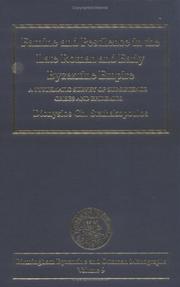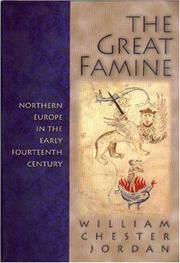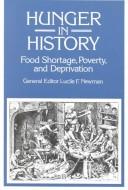| Listing 1 - 5 of 5 |
Sort by
|
Book
ISBN: 9782854435306 2854435303 Year: 2008 Publisher: Chambray-lès-Tours: CLD,
Abstract | Keywords | Export | Availability | Bookmark
 Loading...
Loading...Choose an application
- Reference Manager
- EndNote
- RefWorks (Direct export to RefWorks)
Famine --- --Histoire --- --XIXe-XXe s., --- Famines --- Food relief --- History --- Social aspects --- Histoire --- XIXe-XXe s., 1801-2000 --- Famines - History --- Famines - Social aspects
Book
ISBN: 9781509524679 1509524673 9781509524662 1509524665 Year: 2018 Publisher: Cambridge: Polity press,
Abstract | Keywords | Export | Availability | Bookmark
 Loading...
Loading...Choose an application
- Reference Manager
- EndNote
- RefWorks (Direct export to RefWorks)
"The world almost conquered famine. Until the 1980s, this scourge killed ten million people every decade, but by early 2000s mass starvation had all-but-disappeared. Today, famines are resurgent, driven by war, blockade, hostility to humanitarian principles, and a volatile global economy. In Mass Starvation, world-renowned expert on humanitarian crisis and response Alex de Waal, provides an authoritative history of modern famines: their causes, dimensions, and why they ended. He analyzes starvation as a crime, and breaks new ground in examining forced starvation as an instrument of genocide and war. Refuting the enduring but erroneous view that attributes famine to overpopulation and natural disaster, he shows how political decision or political failing is an essential element in every famine, while the spread of democracy and human rights, and the ending of wars, were major factors in the near-ending of this devastating phenomenon. Hard-hitting and deeply informed, Mass Starvation explains why man-made famine and the political decisions that could end it for good must once again become a top priority for the international community"--
#SBIB:327.4H11 --- Ontwikkelingsproblematiek: hongerprobleem, voedselsituatie. --- Famines --- Food supply --- Social policy --- History --- Development aid. Development cooperation --- Law of armed conflicts. Humanitarian law --- Ontwikkelingsproblematiek: hongerprobleem, voedselsituatie --- Famines - History --- Food supply - History

ISBN: 0754630218 9780754630210 Year: 2004 Volume: 9 Publisher: Aldershot : Ashgate,
Abstract | Keywords | Export | Availability | Bookmark
 Loading...
Loading...Choose an application
- Reference Manager
- EndNote
- RefWorks (Direct export to RefWorks)
Medicine, Greek and Roman. --- Famines --- Epidemics --- Plague --- Médecine grecque et romaine --- Epidémies --- Peste --- History. --- Histoire --- Médecine grecque et romaine --- Epidémies --- Medicine, Greek and Roman --- Greek medicine --- Medicine, Roman --- Medicine, Unani --- Roman medicine --- Tibb (Medicine) --- Unani medicine --- Unani-Tibb (Medicine) --- Medicine, Ancient --- Famine --- Food supply --- Starvation --- History --- Famines - History --- Epidemics - History --- Plague - History

ISBN: 0691011346 0691058911 9786612753145 1400812232 1400822130 1282753142 9781400822133 9780691058917 1400816661 9780691011349 1400804183 9781400804184 9781400816668 9781400812233 9781282753143 Year: 1996 Publisher: Princeton, N.J. : Princeton University Press,
Abstract | Keywords | Export | Availability | Bookmark
 Loading...
Loading...Choose an application
- Reference Manager
- EndNote
- RefWorks (Direct export to RefWorks)
The horrors of the Great Famine (1315-1322), one of the severest catastrophes ever to strike northern Europe, lived on for centuries in the minds of Europeans who recalled tales of widespread hunger, class warfare, epidemic disease, frighteningly high mortality, and unspeakable crimes. Until now, no one has offered a perspective of what daily life was actually like throughout the entire region devastated by this crisis, nor has anyone probed far into its causes. Here, the distinguished historian William Jordan provides the first comprehensive inquiry into the Famine from Ireland to western Poland, from Scandinavia to central France and western Germany. He produces a rich cultural history of medieval community life, drawing his evidence from such sources as meteorological and agricultural records, accounts kept by monasteries providing for the needy, and documentation of military campaigns. Whereas there has been a tendency to describe the food shortages as a result of simply bad weather or else poor economic planning, Jordan sets the stage so that we see the complex interplay of social and environmental factors that caused this particular disaster and allowed it to continue for so long. Jordan begins with a description of medieval northern Europe at its demographic peak around 1300, by which time the region had achieved a sophisticated level of economic integration. He then looks at problems that, when combined with years of inundating rains and brutal winters, gnawed away at economic stability. From animal diseases and harvest failures to volatile prices, class antagonism, and distribution breakdowns brought on by constant war, northern Europeans felt helplessly besieged by acts of an angry God--although a cessation of war and a more equitable distribution of resources might have lessened the severity of the food shortages. Throughout Jordan interweaves vivid historical detail with a sharp analysis of why certain responses to the famine failed. He ultimately shows that while the northern European economy did recover quickly, the Great Famine ushered in a period of social instability that had serious repercussions for generations to come.
Famines --- History --- Histoire --- Europe --- Economic conditions --- Social conditions --- Conditions économiques --- Conditions sociales --- -History --- -Famine --- Food supply --- Starvation --- Council of Europe countries --- Eastern Hemisphere --- Eurasia --- -Social conditions --- -Famines --- History. --- Conditions économiques --- Famine --- 476-1492 --- To 1492 --- Civilization [Medieval ] --- 14th century --- History of Europe --- anno 1300-1399 --- Famines - - History - Europe --- -Europe - Economic conditions - To 1492 --- Europe - History - 476-1492 --- Europe - Social conditions - To 1492 --- -Europe --- FAMINES --- CRISES --- EUROPE --- 14E SIECLE --- HISTOIRE --- CONDITIONS ECONOMIQUES --- 14E-16E SIECLES --- CONDITIONS SOCIALES

ISBN: 1557860440 1557866287 9781557866288 9781557860446 Year: 1990 Publisher: Cambridge (Mass.): Blackwell,
Abstract | Keywords | Export | Availability | Bookmark
 Loading...
Loading...Choose an application
- Reference Manager
- EndNote
- RefWorks (Direct export to RefWorks)
BMLIK
Famines --- Food supply --- Poverty --- 338.439.053.3 --- $?$92/03 --- 93 --- 338.43 <09> --- 351.778.2 <09> --- 351.778.2 <09> Voedselbevoorrading--Geschiedenis van ... --- Voedselbevoorrading--Geschiedenis van ... --- 338.43 <09> Landbouweconomie--Geschiedenis van ... --- Landbouweconomie--Geschiedenis van ... --- Famine --- Starvation --- History --- armoede --- -Poverty --- -History --- History. --- History of civilization --- Landbouweconomie--Geschiedenis van .. --- Voedselbevoorrading--Geschiedenis van .. --- Landbouweconomie--Geschiedenis van . --- Voedselbevoorrading--Geschiedenis van . --- Landbouweconomie--Geschiedenis van --- Voedselbevoorrading--Geschiedenis van --- Famines - - History --- Poverty - History --- Food supply - - History --- -armoede --- -Famines --- Food supply -
| Listing 1 - 5 of 5 |
Sort by
|

 Search
Search Feedback
Feedback About UniCat
About UniCat  Help
Help News
News